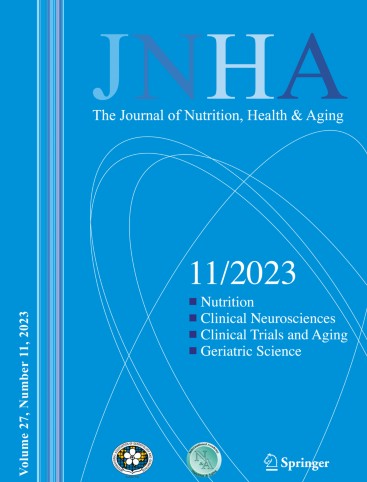Interaction between living conditions and plant-based dietary pattern on cognitive function: A 10-year cohort analysis of Chinese older adults
IF 4
3区 医学
Q1 GERIATRICS & GERONTOLOGY
引用次数: 0
Abstract
Background
Plant-based dietary patterns have been associated with better cognitive function, whereas there has been limited research on the relationship between living conditions and cognitive function. This study aimed to examine these associations in older adults in China.
Methods
This study utilized a ten-year cohort of older adults, including 1630 participants aged 65 and older from the Chinese Longitudinal Healthy Longevity Survey (CLHLS), all of whom had normal cognition at baseline. Living conditions were categorized into three levels: good, fair, and poor, based on three factors: housing stability, economic stability, and personal space. A simplified food frequency questionnaire was used to assess the overall plant-based diet index (PDI). Cognitive function was evaluated using the Chinese version of the Mini-Mental State Examination (MMSE). The latent class trajectory modeling (LCTM) was applied to classify participants into two PDI types: high-rapid-decreasing PDI and low-stable-decreasing PDI. Binomial logistic regression analysis was employed to explore the associations, with further stratified analyses conducted by PDI.
Results
Of the 1630 participants, 48.53% were male, with a median age of 73 years [IQR (Interquartile Range): 69–79]. Living in fair or poor conditions was associated with an 86.0% (OR = 1.860, 95% CI: 1.235–2.798) and 206.1% (OR = 3.061, 95% CI: 1.826–5.131) increased risk of developing cognitive impairment, respectively, compared to those in good living conditions (reference group). The associations between living conditions and cognitive impairment were more pronounced in the “Low-stable-decreasing PDI” group (OR for poor vs good = 3.774, 95% CI: 1.745–8.161) than in the “High-rapid-decreasing PDI” group (OR for poor vs good = 2.344, 95% CI: 1.071–5.130).
Conclusion
A plant-based dietary pattern may help mitigate the negative effects of poor living conditions on cognitive function in older adults. Adhering to a plant-based dietary pattern may serve as an effective preventive strategy to safeguard cognitive health, especially among vulnerable populations exposed to adverse environmental factors, such as limited healthcare access or poor living conditions.
生活条件和植物性饮食模式对认知功能的影响:中国老年人10年队列分析
植物性饮食模式与更好的认知功能有关,然而关于生活条件与认知功能之间关系的研究有限。本研究旨在检验中国老年人的这些关联。方法采用中国健康长寿纵向调查(CLHLS)的1630名年龄在65岁及以上的老年人进行为期10年的队列研究,他们在基线时认知正常。根据住房稳定性、经济稳定性和个人空间三个因素,生活条件被分为好、一般、差三个等级。采用简化的食物频率问卷来评估总体植物性饮食指数(PDI)。认知功能评估采用中文版的简易精神状态检查(MMSE)。采用潜类轨迹模型(LCTM)将被试分为高快速下降型和低稳定下降型两类。采用二项逻辑回归分析探讨相关性,并采用PDI进行进一步分层分析。结果1630名参与者中,男性占48.53%,年龄中位数为73岁[IQR(四分位间距):69-79]。与生活条件良好的人(参照组)相比,生活条件一般或较差的人发生认知障碍的风险分别增加86.0% (or = 1.860, 95% CI: 1.235-2.798)和206.1% (or = 3.061, 95% CI: 1.826-5.131)。生活条件与认知障碍之间的关联在“低稳定下降PDI”组(差对好OR = 3.774, 95% CI: 1.745-8.161)比在“高快速下降PDI”组(差对好OR = 2.344, 95% CI: 1.071-5.130)更为明显。结论植物性饮食模式可能有助于减轻老年人恶劣生活条件对认知功能的负面影响。坚持以植物为基础的饮食模式可能是一种有效的预防策略,可以保护认知健康,特别是在暴露于不利环境因素(如有限的医疗保健机会或恶劣的生活条件)的弱势群体中。
本文章由计算机程序翻译,如有差异,请以英文原文为准。
求助全文
约1分钟内获得全文
求助全文
来源期刊
CiteScore
7.80
自引率
3.40%
发文量
136
审稿时长
4-8 weeks
期刊介绍:
There is increasing scientific and clinical interest in the interactions of nutrition and health as part of the aging process. This interest is due to the important role that nutrition plays throughout the life span. This role affects the growth and development of the body during childhood, affects the risk of acute and chronic diseases, the maintenance of physiological processes and the biological process of aging. A major aim of "The Journal of Nutrition, Health & Aging" is to contribute to the improvement of knowledge regarding the relationships between nutrition and the aging process from birth to old age.

 求助内容:
求助内容: 应助结果提醒方式:
应助结果提醒方式:


